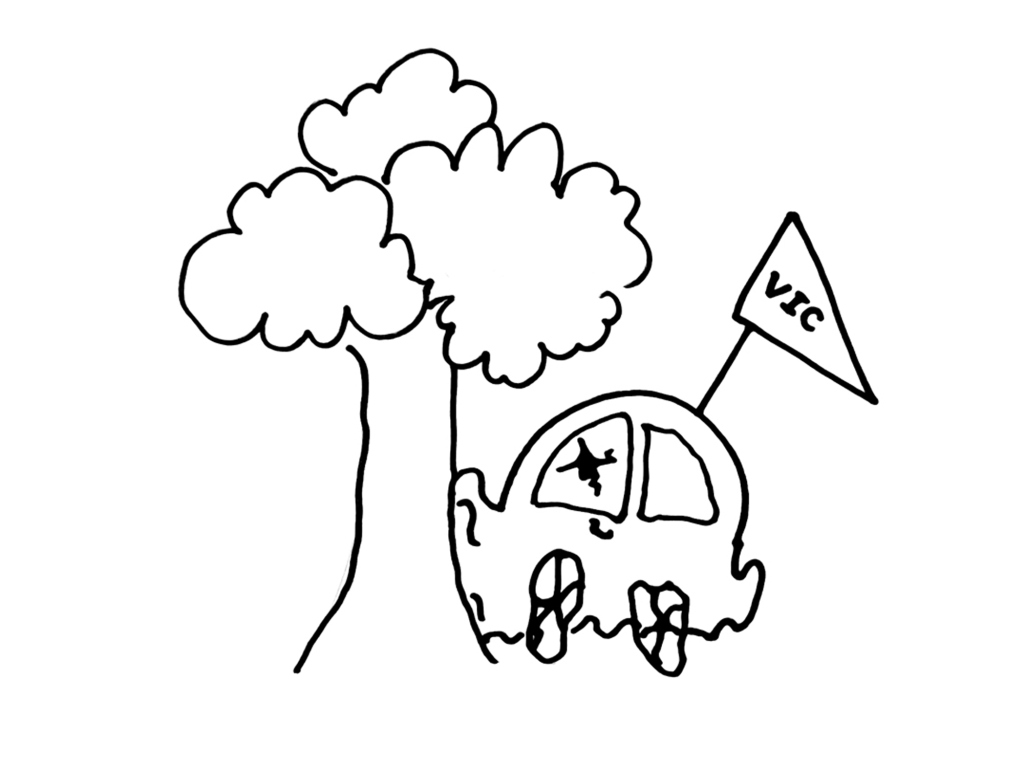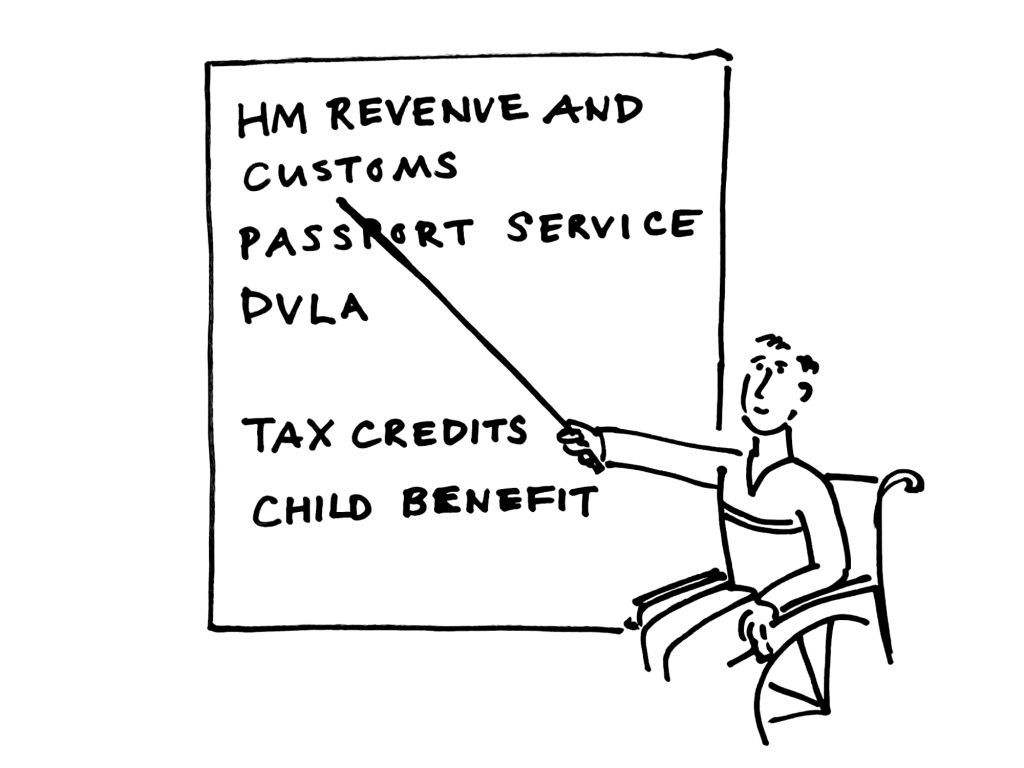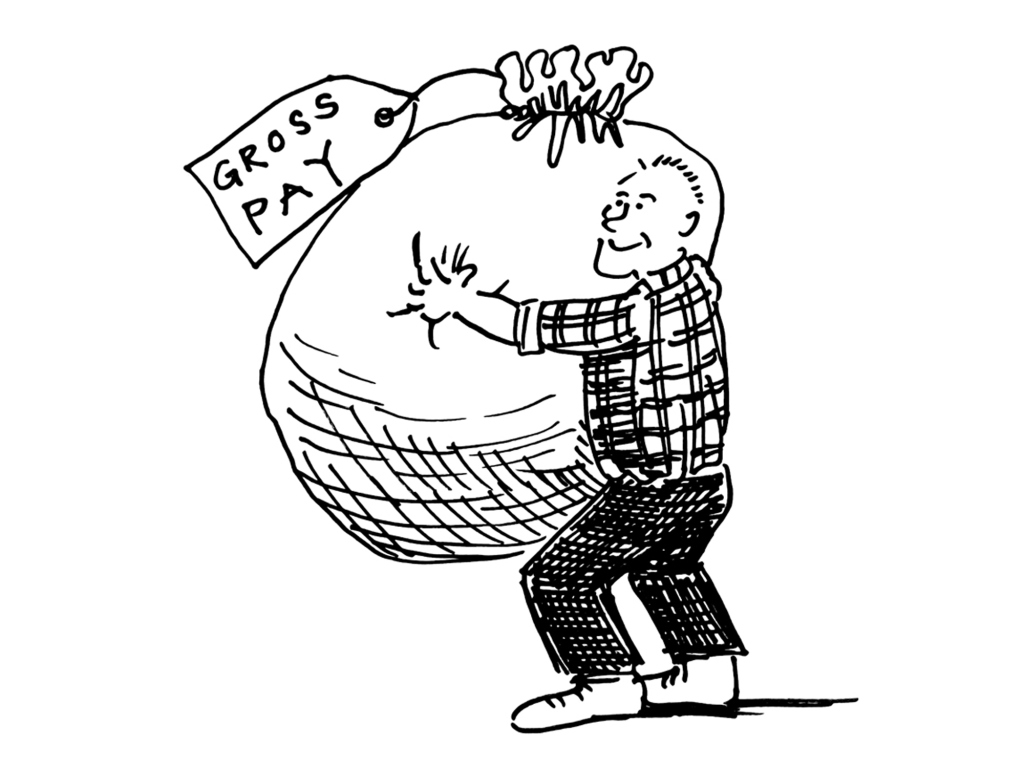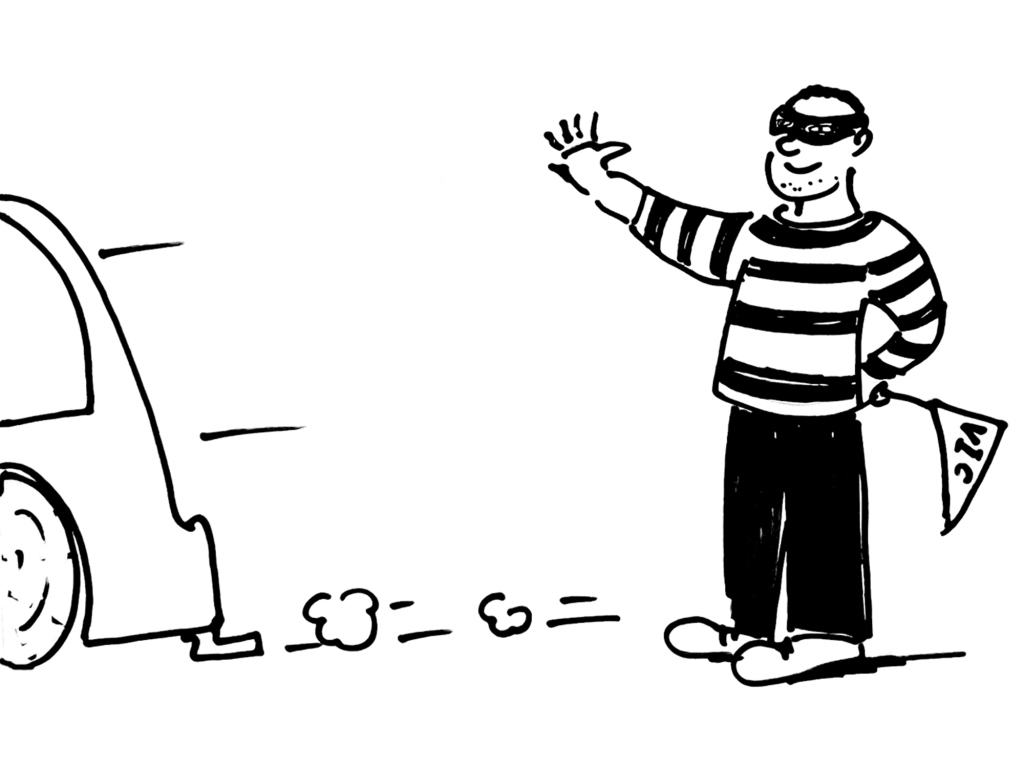UPDATE (23 April 2015): The videos linked to in this blog post have been removed as part of the normal process of updating GOV.UK to better meet user needs.
“You study, you learn, but you guard the original naiveté.”
I wanted to start with this quote because I love it. I’ll tell you who it’s by in a moment, but first some background.
Choose video
When it came to creating video ideas for the beta release of GOV.UK, the brief was that for each of the written guides on the site, there should also be a user friendly video guide containing everything you need to know to get up to speed on tricky subjects like the National Minimum Wage or Vehicle Identity Checks.

It was important for the videos to follow the key design principles of GOV.UK, like hiding complexity and being easy to understand for the widest number of users.

The team at GDS have done a brilliant job of making the written guides short, readable and clear. But these subjects can be quite complicated and we thought, what if some users can’t or don’t want to read the text, or just find it too scary? Are we going to lose them? Can we give them more choice in how they want to get this information?
That thing people just like...
Which brings us back to the quote at the beginning. If you haven’t guessed, it’s by that great master of the line drawing Henri Matisse, and I think it goes to the heart of what really counts when you’re trying to connect with people.
I think what Matisse is talking about here is that childlike thing you feel when you like something, because, well, you just like it. You like your iPhone because you like the feel of it in your hand, something about the weight, the shape – you don’t need to explain it because you can feel it.

Connecting with people
If YouTube has taught us anything, it’s that web videos that connect with people often have Matisse’s naiveté effect – that thing people just like. We’ll take it as a given that the video needs to do what it’s supposed to – if it’s informational it needs to give the user the information they need. But wouldn’t it be great if the video could make you feel good too, put you at ease with the subject so you forget you found it difficult or scary in the first place?

Made by humans, for humans
We’re working in a digital environment which opens up all kinds of possibilities. But for the videos I ended up choosing a medium that meant mixing digital and probably the least digital medium imaginable – pen and paper. Why? Because hand drawn illustrations are so good for giving personality to a subject, and they can bring humour and that human quality people love so much.
So I hired an illustrator, Jacqueline Wheeler, who has a great knack for capturing the essence of a face or a situation in a very simple, uncluttered style. The format we chose was line drawings which are done on paper and then digitised. But these aren’t simply neutral illustrations.
Stock photographs are often used on websites to illustrate situations. I know why these get used, because they’re neutral in tone, a safe option. But they can sometimes feel bland. I wanted the videos to be friendly, have humour and personality, and a unique ‘look’ that you wouldn’t find anywhere else.
The 'Ken Burns effect'
The videos use still images, but that doesn't mean they're static slideshows. To make them flow I used what’s called the 'Ken Burns effect', named after the American filmmaker whose documentaries are admired for their use of archive stills. Burns uses slow pans and zooms to give action to the stills, with the effect that the film flows by you and is a pleasure to watch.
Animatics
The other influence on the style is a format called 'animatics'. These are moving storyboards, often used in the film and TV industry, which give a more dynamic sense of what the film will be like to watch than traditional, static storyboards.

Producing in-house
Given the cost of going through external agencies, it makes good financial sense to produce videos in-house.
The videos are quick and cheap to turnaround. One 6 minute video takes about 3 days to produce. The costs are minimal. The artist is employed on a day rate, the equivalent of a developer. I'm in-house staff, and do all the production and voiceover myself, so there's no extra cost to the business, or the tax payer.
Tell us what you think
Over the coming months I’ll be experimenting with adding some animation effects and sound effects, as the style of the videos evolves.
I see the videos very much as work in progress, and an opportunity to get feedback on what people like and what works in a video with this type of content. So please feel free to tell us what you think.
Links to the videos:
https://www.gov.uk/after-a-death/overview
https://www.gov.uk/vehicle-identity-check/overview
https://www.gov.uk/your-right-to-minimum-wage/overview
Graham Higgins (@grahamhi) is a Digital Content Producer for GDS


35 comments
Comment by Graham posted on
Hi Suzanne
great to hear from you. We use After Effects for our more graphics-based videos. If you'd like to find out more please get in touch with me directly graham.higgins@digital.cabinet-office.gov.uk
Graham
Comment by Suzanne posted on
Hi, just wondering whether there are any specs available for graphics (so opening and closing graphic, infographics, that sort of thing)? Be great to have those to hand as we're looking to generate content that has a consistent brand look and feel across the piece!
Thanks in advance!
Comment by Édouard Garneau posted on
Modérez-vous?
Comment by js posted on
your videos are simply duplicating the content on your pages, plus some drawings. Put another way they are not exploiting the media (ie one which is visually rich)
if you are going to use video, use it to do what text is not so good at - graphically showing the workings of something, telling emotional or dramatic first person stories, delivering powerful messages from experts etc
at the moment it seems like you are making video for the sake of it. It should complement the text, not dublicate it
Comment by nicolasnilsen posted on
I agree completely with js.
Video should not just DUPLICATE content (like a parrot speaking to kids) but show something else or tell it in a DIFFERENT way.
Perhaps, help to SUMMARIZE the ideas or the steps in the procedure that has been described.
Using graphics, colors, and big numbers, you know,
1. Do this.
2. Check that.
3. Be sure to...
So we read the text (usually boring) and then we watch the short video to get a short SUMMARY that would help to remember what we've been reading 😉
Comment by Graham Higgins posted on
thanks for your comments js and nicolasnilsen. Please bear in mind these are experimental prototypes and so your feedback will help us develop our video strategy. You are right, the videos do duplicate the text guides - actually, this is intentional as the intended audience for the videos is users who find text difficult to take in, people with reading difficulties for example. I take your point that a more succinct approach involving summarising more might help here. And I'm really conscious that there is a balance to be struck between making the video visually engaging but also not making it too busy or fast moving. Simplicity is very important here. User feedback on Directgov videos has taught us that when users are trying to take in information, they often find it frustrating if the video is too quick or 'busy' and they can't keep up - this is particularly true of older users. Rest assured, we will be testing the videos with users and working to improve the format based on what we learn.
Comment by Nicolas posted on
I'm watching (trying to watch) the video on my ipad and - of course it doesn't work - you know, all that "flash plugin" crap and nonsense of the previous century!
So please, please use html5 or any solution that works also on iPhones and iPads
UK.gov should be built for the next century. Not the previous decades 🙂
Thanks
Comment by Graham Higgins posted on
Hi Nicolas, sorry for your difficulty. We are working on this. In the meantime, you should be able to watch them on iPad directly in the YouTube channel http://www.youtube.com/govukbeta
Comment by Graham Higgins posted on
Reblogged this on i got digital and commented:
This is a copy of a blog I wrote for the Government Digital Service about creating prototype videos for the new UK government single domain
Comment by Richard Slade posted on
Excellent stuff Graham - like the voice over, you have a friendly and welcoming voice which compliments the illustrations. Keep up the good work.
PS the minimum wage link takes you to the wrong place.
Comment by Graham Higgins posted on
Thanks Richard, I appreciate your good wishes. link fixed now
Comment by Shawn Pearson posted on
These videos don't seem to have closed captions (subtitles). Essential for the deaf and useful for those of us working on computers without sound, for example in a library.
Also it didn't seem to be possible to use the player controls through the keyboard - tabbing etc.
Comment by Graham Higgins posted on
thanks for these comments Shawn, I've raised them in our feedback system. The videos do have captions in YouTube so there is an issue with the embedding in GOV.UK Please see here for the YouTube playlist http://www.youtube.com/playlist?list=PLDCBB61D8A1EA497E
Comment by Richard posted on
The videos don't appear on the three linked pages https://www.gov.uk/after-a-death/overview https://www.gov.uk/vehicle-identity-check/overview
https://www.gov.uk/your-right-to-minimum-wage/overview - have they been removed because of difficulties with captioning?
I learnt today that the video on https://www.gov.uk/tour has no captions (either on Gov.uk or on YouTube). Why is that? Isn't there a policy for all videos to have captions?
Comment by alexcoley posted on
Also, your Matisse quote reminded me of one of my earliest memories of another great artist:
"Every child is an artist. The problem is how to remain an artist once he grows up."
Pablo Picasso.
Stay young and keep making films 😀
Comment by John Ploughman (@johnploughman) posted on
First of all, just the acknowledging that the site needs video from the start is great. It’s what the user wants – either because they can’t or don’t want to read.
I love the idea of these videos – make the subjects clear and simple, just like the written content. But at the moment, something doesn’t feel quite right.
At the Driving Standards Agency, we’ve had over 4.5 million video views on our YouTube channel in the past 3 years. In that time, we’ve realised that creating video content for the web is a huge challenge.
A video view is fine – but getting someone watching the video and leaving with what they wanted is the goal.
We know from YouTube Insights (oh how I love ‘em), that the first few seconds of the video will either:
a) Get the viewer hooked
b) Make them click ‘Back’ so fast that there’s smoke coming from the mouse
We want to get the viewer hooked. How do we do it? Well we’ve found that getting into the content as quickly as possible, giving the viewer visuals that they can relate to, and a well-paced voiceover work well. But then most of our viewers are between 17 and 25 years old.
And maybe this is where it doesn’t feel quite right for me just now. Maybe we need several styles of video, depending on the audience. At the risk of generalising, the audience of BBC Three’s ‘60 seconds’ is very different to BBC Newsnight. Very different styles of addressing the same content.
Now I’m not saying lets have three versions of every video. But let’s optimise for the common case. If it’s student finance or driving tests, let’s have something a bit faster and punchier.
If we’re covering pensions or winter fuel payments, let’s go with something more like has been done on these tests.
We’d be more than happy to share our YouTube Insights with the team at GDS.
Keep up the great work, Graham and team!
Comment by Graham Higgins posted on
Thanks John, I've always admired the work DSA have done with YouTube to build such a large audience. And I think that's such a good point that different audiences have different expectations. It's so good to know that we can draw on your knowledge at the beginning of this journey! I will definitely be in touch.
Comment by Graham Higgins posted on
I should also add that the brief for the videos was about providing an alternative to text for users who may have reading difficulties, so my priority has been simplicity and clarity. I would humbly suggest that these are the most important benchmark to assess them by at this early stage of our video offering.
Comment by Shan Siggers posted on
Hi Graham,
Will British Sign Language video be included in your video offerings? I work for a company who provides British Sign Language videos for websites and obviously advocate strongly for the Deaf Community. When asking my colleagues and friends in the Deaf Community about accessibility on websites Government sites feature very highly in the list of 'which websites are confusing and would benefit from BSL video'.
British Sign Language has been recognised, by the government since 2003, as a stand alone language. BSL is the first language for 100's of thousands of people. Literacy skills for the Deaf Community, on leaving school, is on average 8-11years old. Text in a different language to your first language and having low literacy skills makes websites very difficult to navigate for the Deaf.
I would appreciate your views on this.
Regards
Comment by Graham Higgins posted on
Hi Shan
thanks for your interest in videos on GOV.UK.
BSL content is coming to the site. We have produced two example BSL video guides but we still have some development work to do to display them correctly. We're working on this now and should have something to show in the upcoming weeks.
best wishes
Graham
Comment by Ben posted on
Videos would be beneficial as a supplement to the written guides. Illustrations and photos will also definitely help in the presentation.
Comment by Emma Allen posted on
These look great. Don't know if you've seen the animations we produced for The National Archives website (http://www.nationalarchives.gov.uk/records/quick-animated-guides.htm) a couple of years ago? They were intended to make a fairly complex subject (historical research) a little simpler and less daunting. Happy to share how we approached this and would be interested to learn more about your own approach.
Comment by Graham Higgins posted on
thanks Emma, much appreciated. Interesting to see you took a similar approach. Would be good to chat
Comment by Alex Coley posted on
It's Jackie Wheeler all the way for me. I'm so happy to see this next step in the 'how to' vids. Graham, yours were always ridiculously good. Doing it in house is and should be a point of enormous pride. Remember we were quoted 30grand per video at one point? It was a privilege kicking off this journey with you and it's fantastic you're still flying the flag.
Hope to see more in due course.
Comment by Graham Higgins posted on
thanks for the encouraging words Alex. I always preferred the Roger Corman model of production, as you know! cheers
Comment by Alex Coley posted on
Brilliant Roger Corman, I love the 'verite'. I studied video production on the same course as Reg Traviss (http://www.imdb.com/name/nm1857340/) and remember how prolific he was. Everything done on zero budget with lots of help from mates.
There is still a dusty Super 8 film with me getting bitten on the neck by a Miss Faversham styled vampiress in the rubble of a Southampton basement squat out there somewhere.
p.s. I hope Jackie's still enjoying twitter!
Comment by Lee Martin (@Mouldfish) posted on
I like the approach - simple and clear enough to grab my interest on first visit. But I have a short attention span, so pick up the pace and throw more at me before I get bored and leave! Cut out the details and focus on the key information. If I want to know more I'll read the page content.
Oh, and maybe just 1 colour would add something to the design...
Good luck.
Comment by Graham Higgins posted on
ah yes, but which colour? decisions, decisions. Thanks Lee, I take your points
Comment by Graham Higgins posted on
Thanks Pete
I'm very grateful for the example video link which I really enjoyed. I absolutely agree, the challenge is to make video content engaging and your feedback will help us gauge this all the better. Rest assured we will keep the experiments coming.
Comment by Pete Farrand posted on
I looked at the VIC video. It's nice - but I'm not sure it knows what it's trying to do. It feels like some pleasant pictures to accompany the voice over. But it's a long way off a visual approach which, stand alone, actually explains anything. And is it that engaging?? Cheap doesn't equal good?
Compare & contrast....http://conversation.cipr.co.uk/posts/mark.pack/what-is-the-single-best-thing-we-can-do-for-our-health
Cheers - keep the experiments coming!
Comment by Jonathan posted on
The video that Pete Farrand links to is amazing. I do like the simplicity of the VIC video though and just having the voice-over is enough for me. Keep up the good work guys.
Comment by manicpolitics1 posted on
Videos and quick links are obviously the way to go. The new site is going to be magnificent judging by the enthusiasm of everyone working on it.I haven't quite got the hang yet of relating these various posts to the BETA SITE but the fact that everyone is being asked to comment is just marvellous.
Comment by Graham Higgins posted on
Hi manicpolitics1
many thanks for your good wishes. You're right, there is a huge amount of enthusiasm here to respond to users' needs. We appreciate your comments.
Comment by Janet posted on
I didnt see the videos from which the links purport to find. Is it because I am a Windows Vista user, if so, I think it ought to be explained. My laptop works well & expense a consideration, if that's not too much of a pun.
I definitely think video material would help young people understand more about politics without thinking they arent being included.
Comment by Carrie Barclay posted on
Thanks for getting in touch with us. This blog post is quite out of date now, and the videos on the pages it links to have been removed as part of the normal process of updating GOV.UK to better meet user needs. We shall update the blog post so people know that. Thanks for letting us know.